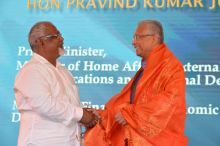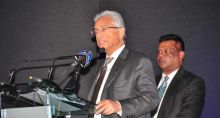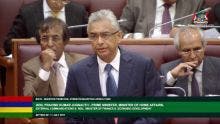The 2016-17 Budget Speech previously scheduled for 6 June 2016 has been postponed and no date has been announced yet. While the appointment of Pravind Jugnauth as new Finance Minister seems to have boosted confidence across the business community, it is only the content of the next Budget that will determine the extent of the ‘Feel Good Factor’.
[[{"type":"media","view_mode":"media_large","fid":"18509","attributes":{"class":"media-image wp-image-31599 alignleft","typeof":"foaf:Image","style":"","width":"250","height":"344","alt":"Finance Minister Pravind Jugnauth"}}]]After his swearing-in ceremony, Finance Minister Pravind Jugnauth stated that the priority of his economic policy is to foster new economic pillars. He was referring mainly to the Ocean Economy and the New Technologies. The government wants to attract more investors in order to create jobs. This is an indication of what we should expect in his forthcoming Budget. It is widely known that each time Pravind Jugnauth has been Finance Minister, he has delivered a Budget with a generous pack of social measures.
Speculation is therefore ripe that the 2016-17 Budget will again thrive in this direction. But with major economic challenges facing the country, balancing the budget will be a daunting task. The rupee has depreciated by more than 20 percent during the past two years, investment is declining, the public debt is rising and unemployment is affecting the youth. Mauritius is also losing competitiveness in some sectors, while emerging sectors are still in the starting block.
The two key terms of the Budget under preparation are investment and job creation. Major projects announced in the past have almost reached completion while new projects are yet to start. In the private sector, we are mainly talking about Smart Cities while new projects in the agribusiness and manufacturing sectors are unheard of. Foreign Direct Investment is below expectation and the country urgently needs to review its offerings to foreign investors. The business climate is constantly evolving but our regulations are not keeping pace with the new requirements of investment.
A reminder of 2010 Budget measures
In his Budget presented in 2010 under the Labour/MSM government, Pravind Jugnauth abolished the much controversial ‘National Residential Property Tax’. He also removed the tax on interest on bank savings. However, this 2010 Budget also introduced Capital Gains Tax which was removed the following year. The central theme of the 2010 Budget was the idea to transform Mauritius into a Duty Free Island. Other popular measures it contained are as follows:- Duty exemption on double cab vehicles bought by fishermen, planters, breeders and registered SMEs.
- Exemption from registration duty on first purchase of immovable property
- Additional 38 scholarships (laureates) for HSC students
- Reintroduction of full subsidies on SC and HSC exam fees
- No rise in VAT rate
- Measures to lower cost of internet access
- Higher taxes on alcoholic drinks, cigarettes and betting activities
- New social housing plans
- Higher tax on plastic bags and bottles
Nicolas Goldstein: “Open MyBiz to foreign investors”
Nicolas Goldstein, an entrepreneur who recently set up the Mauritius Start-Up Incubator (MSI), wishes to see more robust measures to boost the IT sector. “In order to bring foreign investment mainly in the IT and new technologies, it will be good to adapt the ‘MyBiz Program’ of the SMEDA to foreign investors. We should also move from a BPO and call centre industry to New Technologies industry. I would suggest we set up a committee of experts to allow new projects from overseas to get into the MyBiz Scheme. Training will be a key element to prepare our youth for the IT and New Technologies sector,” he says.[[{"type":"media","view_mode":"media_large","fid":"18510","attributes":{"class":"media-image wp-image-31600 alignright","typeof":"foaf:Image","style":"","width":"250","height":"374","alt":"Dr Bhavish Jugurnath"}}]]Dr Bhavish Jugurnath: “Industry transformation and innovation”
Dr Bhavish Jugurnath, Financial Consultant, says that Mauritius is economically at the crossroads of some serious choices – either to continue with the present model of economic development as of neoliberal policies tried elsewhere in given circumstances or we choose a different destiny, a path of serious discovery and inventiveness, by directing our energies to more imaginative forms of planning and policies that produce altogether different outcomes that are more sustainable and inclusive. “Mauritius would find it challenging to advance into the high-income category in an opportune manner if the reform agenda remains in its current mode and the prevailing sub-par growth trends persist. The new Minister should realise our potential for sustainable and inclusive growth with a long-term horizon and vision. The main emphasis should be on creation of greater national wealth with better sharing.” To support his views, he made three proposals:Addressing Near-Term Concerns
In view of the current economic conditions, the Government should provide calibrated measures to address cyclical headwinds while supporting firms to seize opportunities and press on with restructuring. It is very crucial in the current economic context to launch a new Industry Transformation Programme to help Mauritian firms and industries create new value and drive growth. The three key thrusts under the Industry Transformation Programme are: Transforming Enterprises; Transforming Industries and Transforming through Innovation. As we seek to transform enterprises and industries through the Industry Transformation Programme, the Government can provide support for our people to adjust to change and seize new opportunities. An ‘Adapt and Grow’ initiative is also important to help our people adapt to changing job demands and grow their skills.Deepening Innovation Capabilities
To promote start-ups in new and existing industries, the Government can set up a new entity called “Mauritius-Innovate”. Mauritius-Innovate can match budding entrepreneurs with mentors, introduce them to venture capital firms, help them to access talent in research institutes and open up new markets. To help firms access the many grants from various agencies more easily, the Government could consider launching a Business Grants Portal. The portal should organise these grants along core business needs of i) capability building, ii) training and iii) international expansion. In addition to encourage our SMEs to internationalise, the Government can support more firms in their internationalisation efforts through assistance such as the Global Company Partnership and Market Readiness Assistance programmes.Digitisation of the economy
Access to ICT services is no longer the primary issue facing policymakers. Instead, the critical question is how to maximize the adoption, utilization, and impact of these services. Digitization has emerged as a key driver and enabler of socioeconomic benefits. The digital economy is developing rapidly worldwide. It is the single most important driver of innovation, competitiveness and growth, and it holds huge potential for Mauritian entrepreneurs and small and medium-sized enterprises (SMEs). Unfortunately, only few enterprises are currently taking full advantage of new digital opportunities. How Mauritian businesses adopt digital technologies will be a key determinant of their future growth. New digital trends such as cloud computing, mobile web services, smart grids, and social media, are radically changing the business landscape, reshaping the nature of work, the boundaries of enterprises and the responsibilities of business leaders. These trends enable more than just technological innovation. They spur innovation in business models, business networking and the transfer of knowledge and access to international markets. Proposals: In the coming budget government can harness these varying effects of digitisation through three main measures, which go beyond their current roles of setting policy and regulations.- First, government should create digitisation plans for targeted sectors in which they wish to maximize the impact of digitization.
- Second, government should encourage the development of the necessary capabilities and enablers to achieve these digitization plans.
- Finally, government should work in concert with industry, consumers, and government agencies to establish an inclusive information and communication technologies (ICT) ecosystem that encourages greater uptake and usage of digital services.
[[{"type":"media","view_mode":"media_large","fid":"14632","attributes":{"class":"media-image wp-image-24447 alignleft","typeof":"foaf:Image","style":"","width":"202","height":"225","alt":"ARVIND NILMADHUB"}}]]Arvind Nilmadhub: “Duty Free Island is possible, but...”
Economist Arvind Nilmadhub is of the view that the Duty Free Island project is possible and viable and it is in the interest of the economy. “This has been many times announced and then shelved, according to the mood of politicians. This innovative project should be considered. Our shopping malls need this boost, especially with tourism expanding, according to official figures, and with the opening of an Air Corridor between Asia and Africa, through Singapore and Mauritius. We need more visitors to sustain businesses. Obviously, the Duty Free concept will have an impact on SMEs, but the future of SMEs should be an integral part of the Duty Free Island project, as it is possible to include them through palliative measures. But looking from another angle, we see that SMEs can also benefit from this concept, as we open up to Africa. It must be noted that, currently, most of imported products are already duty free or carry very low rates of duties. Customs revenues are on the decline. Mauritians who travel a lot are already doing duty free shopping abroad, and we can capture this segment if they spend here itself. Regarding the overall Budget, I hope to see it oriented towards production, sustainability and efficiency. Through the years, the Budget has been reduced to a simple arithmetic exercise, with a few populist measures, while there is no real strategic and long term thinking. Now is the opportunity for the new minister to rethink this exercise.”[[{"type":"media","view_mode":"media_large","fid":"18511","attributes":{"class":"media-image wp-image-31601 alignright","typeof":"foaf:Image","style":"","width":"151","height":"192","alt":"Gavin-Ng"}}]]Gavin Ng: “Mauritians have already expressed themselves”
Gavin Ng, Analyst, feels that a large cross section of society have already expressed themselves on the mauritiusfinance.com platform launched by the Budget Team. “I think the new minister of finance simply has to go through the vast amounts of impressive proposals and ideas expressed there and get inspiration for his Budget. This platform is an excellent tool and it holds the foundation for a new economic reorientation. I hope those concerned take good note of these ideas,” he says.
Notre service WhatsApp. Vous êtes témoins d`un événement d`actualité ou d`une scène insolite? Envoyez-nous vos photos ou vidéos sur le 5 259 82 00 !

































